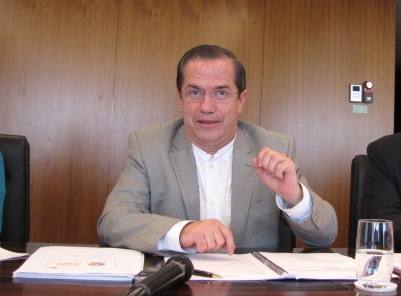‘Assange’s safe passage a matter of rights’
Ecuador-U.K. wrangling over fate of WikiLeaks founder spills into foreign minister’s Korea trip
By Korea HeraldPublished : June 20, 2013 - 20:23
The human rights of Julian Assange trump any regulation obliging the United Kingdom to extradite him, according to Ecuador’s top diplomat.
Ecuadorian Foreign Minister Ricardo Patino, in Seoul for talks on expanding the Latin American country’s investment and trade relationship with Korea, said Britain had an obligation under international law to provide Assange with “safe passage” to Ecuador.
“According to all the international conventions, the U.N. Charter, the charter on human rights, and the international human rights association, a person has a right to enjoy his fundamental human rights,” Patino said in an interview with The Korea Herald at a hotel in Seoul on Thursday.
Ecuadorian Foreign Minister Ricardo Patino, in Seoul for talks on expanding the Latin American country’s investment and trade relationship with Korea, said Britain had an obligation under international law to provide Assange with “safe passage” to Ecuador.
“According to all the international conventions, the U.N. Charter, the charter on human rights, and the international human rights association, a person has a right to enjoy his fundamental human rights,” Patino said in an interview with The Korea Herald at a hotel in Seoul on Thursday.


“Julian Assange, although he has these rights, is unable to enjoy them because he has been forced to stay in the embassy for more than one year now. He is as of now not able to enjoy his fundamental human rights that he is entitled to.”
Patino met British Foreign Minister William Hague in London on Monday to present him with documents outlining arguments for why Britain’s international humanitarian obligations compelled the country to provide safe passage.
The British Foreign Office said in a statement on its website that any resolution would need to be within the laws of the U.K.
Assange arrived at the Ecuadorian Embassy in the posh Knightsbridge area of London on June 19, 2012, almost exactly a year ago to the day. The British government has said he will be arrested if he leaves the building.
Patino said he met Assange on June 16 and that he was “doing well,” despite the round-the-clock police perimeter that encircles the embassy.
The founder of WikiLeaks, which embarrassed the U.S. government when it revealed thousands of American diplomatic cables and possible war crimes committed by U.S. soldiers in Iraq and Afghanistan, sought asylum at the Ecuadorian Embassy after Britain’s supreme court refused to reopen his appeal against extradition.
Assange has said he fears he will be eventually sent to the U.S. where he is certain to face the death penalty for espionage.
The U.S. Justice Department has said it is exploring possible charges against WikiLeaks and Assange for the release of the diplomatic messages. U.S. Attorney General Eric Holder said charges may be brought under a World War I-era law, the Espionage Act of 1917.
“Ecuador has an obligation to protect his life, as well as his personal integrity against attacks, and the United Kingdom has an obligation to provide him with safe passage,” said Patino, adding that his country valued fundamental principles and was a country that “acts on its sovereignty.”
Out of the Monday meeting between Patino and Hague came an agreement to set up a working-level commission to find a diplomatic solution for Assange’s asylum status and his legal situation in Britain, but Patino said he was determined to get Assange safe passage to Ecuador.
A spokesperson from the British Embassy in Korea said Britain’s legal obligation under international human rights law was being measured against the bid for extradition.
“Human rights of course are being taken into consideration but, human rights notwithstanding, Britain has an obligation to send him to Sweden to face questioning concerning these rape allegations,” said British Embassy spokesperson Colin Gray.
“The U.K. claims it has an obligation under a European regulation to detain and extradite Mr. Assange, but if one speaks about the legality of this, especially under international legal norms, international human rights and humanitarian law, (his safe passage) is more important than the European obligation of extradition,” Patino said.
By Philip Iglauer (ephilip2011@heraldcorp.com)
-
Articles by Korea Herald



![[Exclusive] Korean military set to ban iPhones over 'security' concerns](http://res.heraldm.com/phpwas/restmb_idxmake.php?idx=644&simg=/content/image/2024/04/23/20240423050599_0.jpg&u=20240423183955)

![[Graphic News] 77% of young Koreans still financially dependent](http://res.heraldm.com/phpwas/restmb_idxmake.php?idx=644&simg=/content/image/2024/04/22/20240422050762_0.gif&u=)



![[Pressure points] Leggings in public: Fashion statement or social faux pas?](http://res.heraldm.com/phpwas/restmb_idxmake.php?idx=644&simg=/content/image/2024/04/23/20240423050669_0.jpg&u=)










